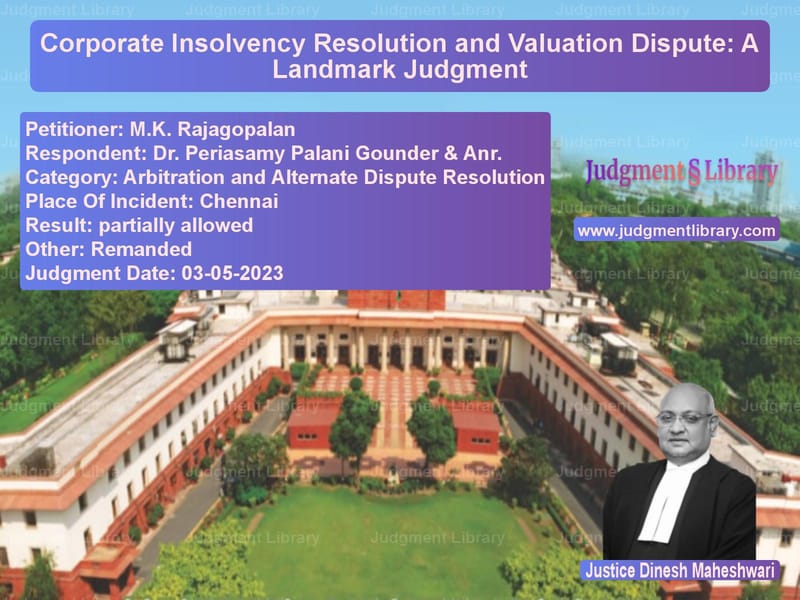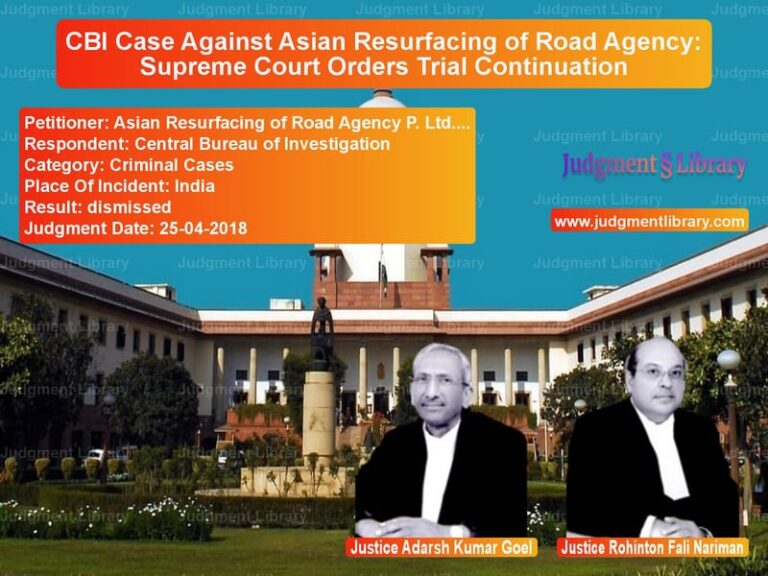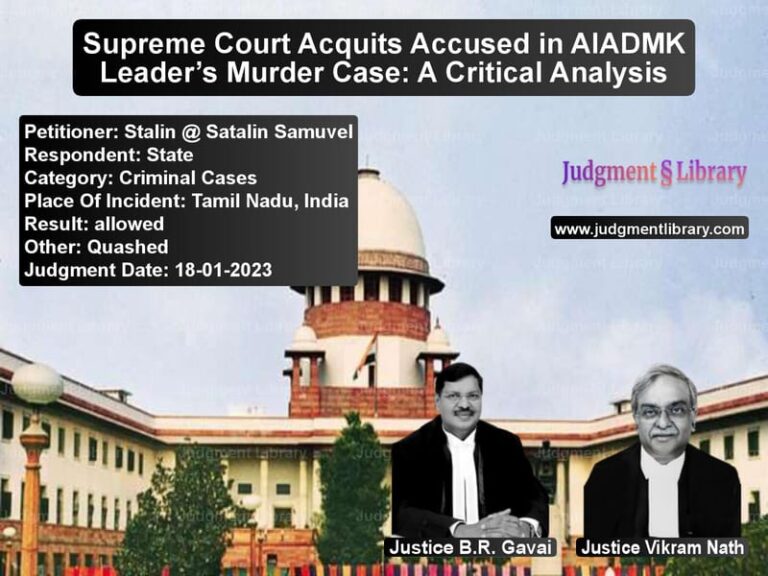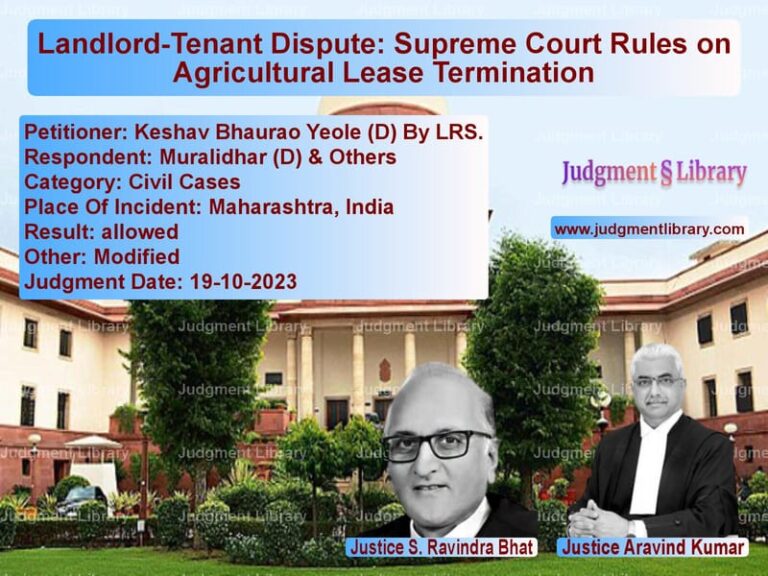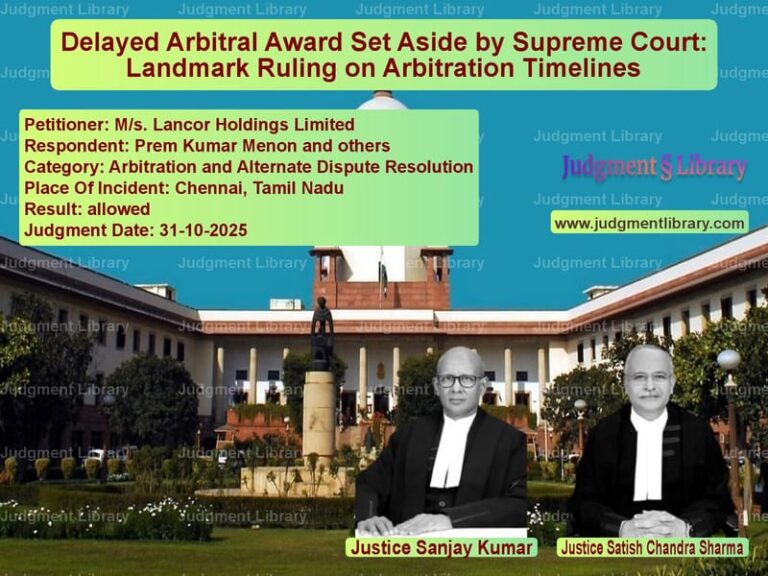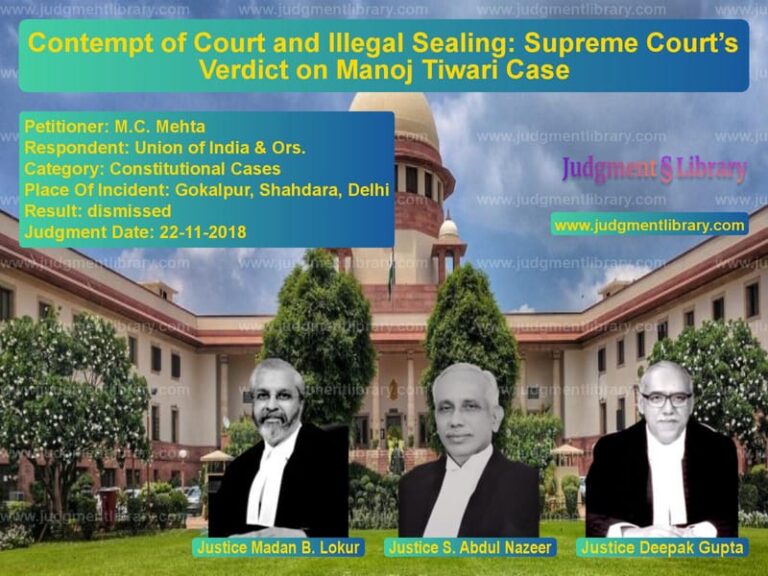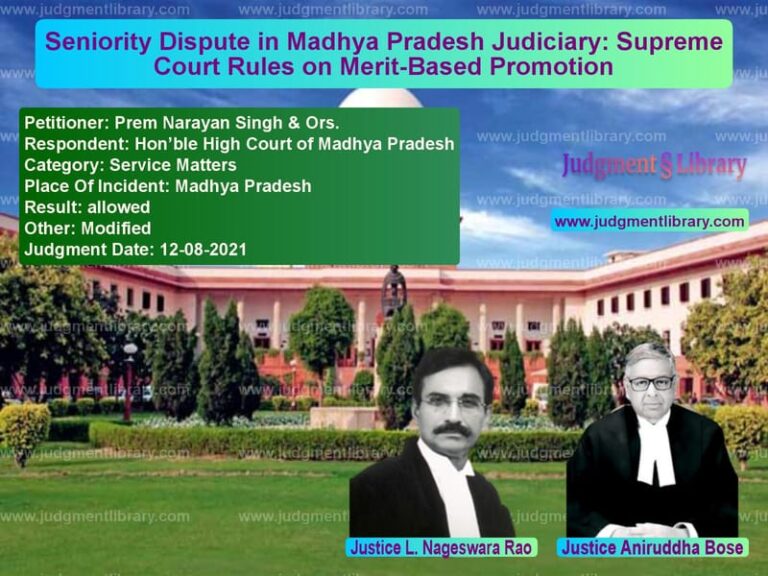Corporate Insolvency Resolution and Valuation Dispute: A Landmark Judgment
The case of M.K. Rajagopalan vs. Dr. Periasamy Palani Gounder & Anr. revolves around a corporate insolvency dispute under the Insolvency and Bankruptcy Code, 2016 (IBC). This landmark judgment by the Supreme Court of India addresses critical legal issues, including the eligibility of resolution applicants, the validity of asset valuation, procedural lapses in the insolvency resolution process, and the discretionary powers of the Committee of Creditors (CoC).
The case primarily arose from the insolvency proceedings of Appu Hotels Limited, initiated by Tourism Finance Corporation of India Limited (TFCI) under Section 7 of the IBC. Various legal and procedural aspects were contested, leading to multiple appeals before the National Company Law Appellate Tribunal (NCLAT) and the Supreme Court.
Background of the Case
The corporate insolvency resolution process (CIRP) against Appu Hotels Limited was initiated after the company defaulted on its financial obligations. The matter was referred to the National Company Law Tribunal (NCLT), which admitted the insolvency plea and appointed a resolution professional (RP) to oversee the process.
Following the publication of the Expression of Interest (EOI), several resolution plans were submitted. The CoC ultimately approved the resolution plan of M.K. Rajagopalan with an 87.39% voting share. However, the plan was subsequently challenged on multiple grounds, including procedural lapses, valuation concerns, and the alleged ineligibility of the resolution applicant.
Key Issues in the Judgment
1. Validity of Asset Valuation
One of the primary contentions in the case was the alleged irregularities in the valuation of Appu Hotels Limited’s assets. The appellant argued that the fair value and liquidation value of the assets were not correctly determined, leading to an unfair CIRP process.
The Supreme Court analyzed the provisions under Regulations 27 and 35 of the CIRP Regulations and found that the resolution professional had engaged two registered valuers who conducted physical verification of the assets. The Court upheld the valuation process, noting that there was no material irregularity in its execution.
2. Non-Publication of Form G
Another major contention was the failure to publish Form G, which invites expressions of interest from prospective resolution applicants. The appellant argued that this omission led to a lack of competitive bidding, thereby reducing the potential realization value for creditors.
The Supreme Court observed that while the non-publication of Form G was an irregularity, it did not render the CIRP invalid. The Court emphasized that the commercial wisdom of the CoC takes precedence in such matters and that procedural lapses must be assessed based on their material impact.
3. Eligibility of the Resolution Applicant
The NCLAT had held that the resolution applicant, M.K. Rajagopalan, was ineligible under Section 29A(e) of the IBC, as he was allegedly disqualified under Section 164(2)(b) of the Companies Act. However, the Supreme Court examined the disqualification criteria and found that the resolution applicant was not disqualified. The Court emphasized that financial credentials must be assessed independently and not be influenced by the status of other associated entities.
4. Section 12-A Settlement Offer
The appellant, Dr. Periasamy Palani Gounder, had submitted multiple settlement proposals under Section 12-A of the IBC. The Supreme Court held that the CoC had the discretion to either accept or reject such proposals, provided it followed the statutory framework.
The Court acknowledged that a revised settlement proposal was later approved by the CoC with 100% voting share. While the earlier rejection of the settlement proposal was upheld, the Court allowed the process to be revisited in light of the new proposal.
Final Judgment
The Supreme Court ruled in favor of the resolution plan submitted by M.K. Rajagopalan, stating that:
- The commercial wisdom of the CoC is paramount in CIRP.
- Procedural lapses, unless materially affecting the process, do not vitiate the resolution plan.
- The resolution applicant was eligible under the applicable provisions.
- The valuation process was conducted in accordance with CIRP Regulations.
- The settlement proposal approved with 100% voting share by the CoC may be considered.
Key Takeaways from the Judgment
- This judgment reaffirms the principle that the CoC has the final authority in approving resolution plans.
- Procedural lapses such as non-publication of Form G do not necessarily invalidate CIRP.
- Resolution applicants must meet the eligibility criteria under IBC, and disqualifications must be substantiated with clear evidence.
- Valuation disputes must be backed by substantive evidence and not mere allegations.
- Settlement proposals under Section 12-A can be considered but are not mandatory for the CoC to accept.
This landmark judgment clarifies several ambiguities in the corporate insolvency resolution process and reinforces the legal framework for handling financial distress cases.
Petitioner Name: M.K. Rajagopalan.Respondent Name: Dr. Periasamy Palani Gounder & Anr..Judgment By: Justice Dinesh Maheshwari.Place Of Incident: Chennai.Judgment Date: 03-05-2023.
Don’t miss out on the full details! Download the complete judgment in PDF format below and gain valuable insights instantly!
Download Judgment: m.k.-rajagopalan-vs-dr.-periasamy-palani-supreme-court-of-india-judgment-dated-03-05-2023.pdf
Directly Download Judgment: Directly download this Judgment
See all petitions in Arbitration Awards
See all petitions in Dispute Resolution Mechanisms
See all petitions in Commercial Arbitration
See all petitions in Enforcement of Awards
See all petitions in Judgment by Dinesh Maheshwari
See all petitions in partially allowed
See all petitions in Remanded
See all petitions in supreme court of India judgments May 2023
See all petitions in 2023 judgments
See all posts in Arbitration and Alternate Dispute Resolution Category
See all allowed petitions in Arbitration and Alternate Dispute Resolution Category
See all Dismissed petitions in Arbitration and Alternate Dispute Resolution Category
See all partially allowed petitions in Arbitration and Alternate Dispute Resolution Category

